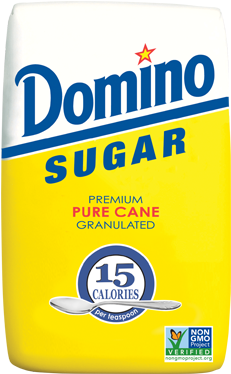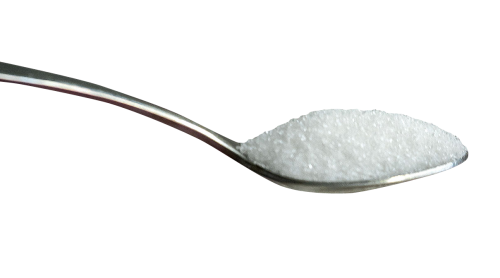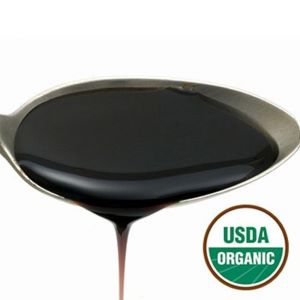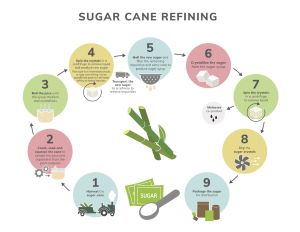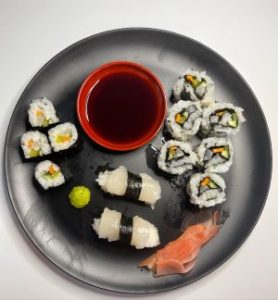Posted on
June 06, 2023 by
The VRG Blog Editor
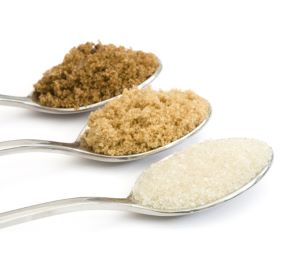
By Jeanne Yacoubou, MS
The Vegetarian Resource Group received an email in April 2022 that asked if cow bone char processing is permissible in organic sugar production in any countries outside the United States. The writer asked specifically about sugar processing in England.
Cow bone char is the major way non-organic cane sugar is decolorized in the U.S. although other methods are becoming more common. Readers may find our 2021 article on cow bone char use in the U.S. helpful.
On the other hand, cow bone char as a processing aid is not permitted in USDA 100% certified organic cane sugar.
To find out about cow bone char in sugar processing in other countries including England, The VRG first turned to organizations that certify vegetarian and vegan food products in England.
The Vegan Society on Cow Bone Char
Since 1990, The Vegan Society has been certifying products as vegan. On their website is a list of all products from brands that they have approved. According to their Vegan Trademark Standards, this vegan certifier states: “The manufacture and/or development of the product, and its ingredients, must not involve or have involved, the use of any animal product, by-product or derivative.”
Here is our email exchange from April 2023:
The VRG: Can certified organic cane sugar in England be filtered through cow bone char to decolorize it or filter impurities and still be called vegan?
The Vegan Society: In the past, cane sugar used to be processed with bone char. It is something that still occasionally happens in the USA but is becoming less and less common. Beet sugar is generally speaking not processed with bone char and sugar grown in the UK is almost certainly not processed with bone char. Products containing sugar which are registered with our Vegan Trademark will be 100% vegan, and therefore will not use sugar processed with bone char. You can find all the vegan sugars we have registered with the trademark. Unfortunately, if a product is not registered with our Vegan Trademark, we cannot confirm that it is vegan as we have not seen a full list of ingredients and are not aware of the manufacturing process. For products not registered with us, our best advice is to contact the manufacturer directly and ask them where their sugar comes from and how it has been processed.
The Vegetarian Society of the UK on Cow Bone Char
The VRG also reached out to The Vegetarian Society of the United Kingdom. We wanted to know if they certify as either vegetarian or vegan products containing cane sugar that has been processed through cow bone char. This certifier offers two labels: one meeting their vegetarian standards; and the other, their vegan standards. The standards for both state that they will not certify: “any product that contains, consists of, or has been produced with the aid of products consisting of or created from, any part of the body of a living or dead animal.”
Here is our email exchange from April 2023:
The VRG: Can certified organic cane sugar in England be filtered through cow bone char to decolorize it or filter impurities and still be called vegan?
The Vegetarian Society of the UK: To check the products that are accredited by the Vegetarian Society, please follow the link here. If the product is not licensed to carry the Vegetarian Society Approved trademark, we are unable to verify its suitability for vegetarians. That does not mean the product is not vegetarian, just that we cannot confirm this. We recommend that you contact the manufacturer directly to confirm the product’s suitability for vegetarians.
The VRG: I notice on your sugar page that some products are vegetarian-approved while others are vegan-approved. I’m guessing cow bone char filtration is the reason for the difference? Here is our key question: Do you certify sugar that has been filtered by cow bone char as vegetarian or vegan? If you do not certify the products yourself, could you please connect me with the person in your organization who does?
The Vegetarian Society of the UK: We don’t accredit any sugar products that are processed with bone char. The only sugar that may be veggie-approved as opposed to vegan may be a product that uses honey or lactose as a “sugar” instead of vegan granulated/brown sugar. [VRG Note: Bolded by VSUK]
Cow Bone Char in Europe
The VRG wanted to find out if cow bone char is used to process cane sugar, either organic or non-organic cane sugar, in Europe. We started our investigation by contacting leading organic certifiers in France and Germany.
We first heard from Alessandro Pulga from Bioagricert. Here is our email exchange from April 2023:
The VRG: Can cow bone char be used to filter impurities in certified organic cane sugar in France?
Bioagricert: The adjuvants (including those useful for filtration) suitable in the transformation of organic products are listed in EU Reg. 1165/2021 ANNEX V.
The list indicates also other substances of animal origin (casein, isinglass, etc.) but NOT cow bone char. [VRG Note: Underlined by Pulga] To my knowledge, modern sugar refining techniques adopted in Europe no longer involve the use of bone char. It can be helpful to know where sugar is refined. Even if it is sold in France, the sugar may have been refined in non-EU countries. Organic certification should also protect in non-EU countries but certainly, in these cases, explicit declarations could be requested as a precaution.
The VRG: I’d like to reach out to the major sugar companies supplying Europe. Which companies do you suggest I look into? I understand they may be headquartered outside of Europe.
Bioagricert: I can suggest ASR Group, one of the main international companies. I advise you to also contact FLO and FLOCERT who certify producers of Fairtrade sugar (often it is also organic). They know all the producers in non-EU countries who also meet ethical requirements.
The VRG also received a reply from Bernhard Furtner of Control Union Certification in Germany. Here is our email exchange from April 2023:
The VRG: Can cow bone char be used to filter impurities in certified organic cane sugar in Germany?
Control Union: Organic cane sugar is not produced in Germany. Hence, I have no knowledge and we have no expertise on this matter.
The VRG: Is non-organic cane sugar produced in Germany? If so, do sugar companies use cow bone char as a filter medium? If not, what do the refineries use to decolorize it? If all of your sugar is imported, which company(ies) supply it? If you don’t know, could you direct me to someone who could help?
Control Union: Sugar cane is simply not grown in Europe. We grow beet sugar because it is adapted to European weather. Actually the European sugar demand was one of the main reasons of colonialism and slavery in the tropics and subtropic areas worldwide but mainly in the Caribic e.g. Brasil. It was Napoleon who promoted sugar production from sugar beet as a ration to the English sea blockade of Europe in war time. But now to your second question. I think today nobody uses cow bone char to a larger extent. You can try to contact the Brazilian Sugarcane Industry and Bioenergy Association. They should know everything about sugar and sugar cane.
The VRG: So you’re saying beet sugar is more commonly consumed in Europe than cane sugar?
Control Union: Yes, in Europe sugar cane is somehow “exotic” and much more expensive than beet sugar.
Cane Sugar in Europe
In Europe, most sugar is from sugar beets, not cane sugar. Here’s a graph that illustrates this point:

The European Commission states on its website:
“The European Union is the world’s leading producer of beet sugar, with around 50% of the total amount. However, beet sugar represents only 20% of the world’s sugar production, with the other 80% produced from sugar cane.
Most of the EU’s sugar beet is grown in the northern half of Europe, where the climate is more suitable. The most competitive producing areas are in northern France, Germany, the Netherlands, Belgium, and Poland. The EU also has an important refining industry that processes imported raw cane sugar.”
As The VRG previously reported, sugar beet processing never involves cow bone char. Only cane sugar may have been filtered through cow bone char.
So, if you are in Europe, it’s most likely that the sugar you buy and the sugar in European-made food products is from beet sugar. Cow bone char use is not a concern in most of organic or non-organic sugar grown in Europe. When in doubt, contact the sugar manufacturer. Have brand name and lot number ready so the bag of sugar you’re holding or considering buying can be looked up easily.
USDA vs. EU Organic Standards: Cow Bone Char
In 2012, after three years of deliberation, the United States and the European Union (EU) agreed that their organic labels would be equivalent. In other words, a product with a USDA Organic label sold in Europe would be considered as meeting European organic standards, and vice versa.
Then in 2020, the EU announced they would reconsider this equivalence because of stricter standards they plan on incorporating into their organic rules and regulations. The U.S. and the EU have until 2025 to reach an agreement.
However, when it comes to the use of cow bone char in cane sugar processing, The VRG noticed a key difference between the U.S. and the EU regulations. It involves the use of the term activated carbon and the sources used to make it.
How Are Activated Carbon and Cow Bone Char Related?
Although cow bone char is not, strictly speaking, the same thing as activated carbon, they are very similar. Cow bone may be used to produce activated carbon. When cow bone is heated at high temperatures under strict conditions, it becomes cow bone char (like charcoal). So, cow bone char may also be called activated charcoal which is another name for activated carbon. Coconut shells, wood, or coal can also be used to produce activated charcoal.
Thus, for instance, The VRG discovered in 2021 that ASR Group, a major global sugar refiner, may use animal bone for its activated charcoal, which it sometimes refers to as biochar or natural charcoal. In 2012, we reported that Australia uses coal to make its activated charcoal.
USDA vs. EU Regulation Terminology: Activated Carbon
First, it is true that cane sugar carrying the USDA organic label has not been processed through cow bone char.
The U.S. regulation reads: § 205.605 Nonagricultural (nonorganic) substances allowed as ingredients in or on processed products labeled as “organic” or “made with organic (specified ingredients or food group(s)).”
- 2 Activated charcoal (CAS #s 7440–44–0; 64365–11–3)—only from vegetative sources; for use only as a filtering aid.
This regulation means that activated charcoal is permitted as a processing aid in organic foods if it is derived from plant sources (for example, coconuts husks).
On the other hand, the EU Organic regulations do not specify the allowed source(s) for activated carbon as a processing aid in organic food products.
ANNEX V Authorised products and substances for use in the production of processed organic food and of yeast used as food or feed
SECTION A2 – PROCESSING AIDS AND OTHER PRODUCTS, WHICH MAY BE USED FOR PROCESSING OF INGREDIENTS OF AGRICULTURAL ORIGIN FROM ORGANIC PRODUCTION
Activated carbon
(CAS-7440-44-0)
We know that these two sections of the U.S. and EU regulations are talking about the same thing (processing aids). Further, we know they are both talking about the same substance because the CAS numbers – unique, numeric identifiers used to designate only one substance – are the same in both regulations: CAS-7440-44-0.
Note that only the wording is different: activated carbon vs. activated charcoal. But as described in the previous subsection, activated carbon and activated charcoal are synonymous. The terms may be used interchangeably. More relevant for this article, they both may refer to cow bone char.
Based on these regulations, if you’re in a EU-member country and see an organic label from an EU-member country on a bag of cane sugar, you cannot assume that it has not been processed through cow bone char, despite the supposed equivalence of the USDA and EU labels as noted above. However, all European sources we spoke with – cited in this article – stated cow bone char is not used in Europe anymore in cane sugar processing.
Follow-up with Pulga of Bioagricert
Recalling from a previous section in this article featuring the transcript of The VRG’s email exchange with Pulga of Bioagricert, Pulga stated that EU regulations do not permit the use of cow bone char as a processing aid.
While it is true that the term cow bone char does not appear in the regulation, we noticed that activated carbon does. Use of activated carbon as a processing aid is permitted in organic foods. We asked Pulga to comment on this. Here is our exchange:
The VRG: You stated that EU regulations don’t permit bone char in organics…It seems organic sugar MAY be processed with cow bone char in the EU. Only if activated carbon is used to include bone char. Activated carbon is listed.
Pulga: The European organic regulation only admits vegetable carbon for use as an additive, activated carbon (vegetal or animal) is allowed as an adjuvant. Following past problems with mad cow disease is now increasingly of vegetable origin. In any case we ask for this declaration for our vegan certification scheme. In any case, [my contact] confirmed to me that SRB and most of the other sugar producers in the world can easily provide declarations about the non-use of adjuvants of animal origin. [VRG Note: Underline is Pulga’s]
So is there the permissibility of cow bone char as a processing aid in European organic cane sugar production?
A complete answer turns on the meaning of adjuvant. Clearly, cow bone char is not an adjuvant in the sense of an additive to sugar. However, if adjuvant is used to refer to a processing aid, then cow bone char could be permitted.
European Commission on Cow Bone Char in Organic Cane Sugar
The VRG reached out to the European Commission who wrote the organic standards for more clarification on cow bone char as an allowable adjuvant, but received a general reply that did not answer our question. For the record, here it is:
“Every country in the European Union appoints a ‘competent authority’ who is ultimately responsible for making sure that EU organics rules are followed. Usually these are either a department of agriculture or a department of public health.
This competent authority can delegate its role to:
- one or more private control bodies
- one or more public control authorities
- a mixed system with both private control bodies and public control authorities.
Regardless of the system chosen, the competent authority is ultimately responsible for auditing the inspection system within its own area of responsibility.
Once a year, EU countries report to the European Commission on the results of the controls carried out on organic operators and on the measures taken in case of non-compliance.
Organic farming information system (OFIS)
The OFIS database contains ingredient authorisation and information on control authorities and control bodies.
The European Commission supervises EU countries to ensure that they fulfill their responsibilities. This helps build consumer trust, as EU consumers know that organic goods will have been rigorously inspected regardless of which EU country they originated in.
We invite you to visit this webpage to get more information.”
Bioagricert and Cow Bone Char
Taking the advice of the European Commission, The VRG analyzed Bioagricert’s organic standards, considering Bioagricert as an example of a “control body.”
Interestingly, cow bone char does not appear in the Bioagricert standards, even in the list of filtration aids that are excluded: “filtration aids with gelatin, egg white (from battery farms), fish glue or cases derived from shells or crabs.” [VRG note: This list is likely for filtration aids in wine production.] The rules for “the preparation of vegetarian products” state “products containing ingredients derived from meat or bones” are excluded. Apparently, cow bone char would be excluded.
For vegan products, the terminology gets closer to a reference to cow bone char. Coals of animal origin are listed as non-compliant substances. So, again, cow bone char could not be used in the processing of organic cane sugar.
However, Bioagricert regulations also states: “IT IS FORBIDDEN to use any substance, ingredient, additive or adjuvant or derivative of animal origin or which entails for its attainment procedures which provide, directly or indirectly, the sacrifice and/or mistreatment of animals.” Since cow bones used to make char are derived from “cattle that have died naturally in Brazil, India, Morocco, Nigeria, and Pakistan” as The VRG reported previously, this prohibition would not apply to the use of cow bones for activated charcoal production in cane sugar processing.
How Common is Cow Bone Char in Cane Sugar Refining around the World?
In a 2012 article, The VRG reported that cane sugar is decolorized by activated carbon derived from coal in Australia.
Experts in England, France, and Germany interviewed for this article believe that cow bone char is not used in Europe today.
To confirm this, The VRG contacted cane sugar refiners around the world. We reached out to sugar refining companies in eight countries, and received replies from four of them. This is what we learned:
Canada’s Redpath: “We do not use animal products or by-products in our refining process for sugar, so Redpath Sugar products are suitable for vegetarians and vegans.”
Italy’s SRB: “Sugar extraction techniques have not included the use of cow bone char. It is a technological practice that has become obsolete practically all over the world.”
UK’s Tate & Lyle: “We do not use bone char in the processing of our sugar products.”
Portugal’s Sidul Açúcares: “We don’t use bone char in our sugar refining process in Portugal.”
The VRG also contacted FLOCERT in Costa Rica. They certify fair trade products. Here is our email exchange:
The VRG: Can cow bone char be used to filter impurities in FLOCERT-certified organic cane sugar?
FLOCERT: If the cow bone char is used in the process but it is not part of the ingredients, there is no need to report it.
The VRG: Is there any company that you certify (no need to reveal their identity) that uses cow bone char in their sugar processing?
FLOCERT: We don’t certify cow bone char or any animal product. You can verify our certified products here. However, it is possible that a company uses cow bone char or any animal-derived product in their process or ingredients. Please find how Fairtrade manage the mark in the products and the ingredients here.
The VRG Recommendations on Avoiding Cow Bone Char Processing in Cane Sugar
Based on our multi-year investigations, here are some recommendations to ensure your sugar is cow bone char-free:
- Choose USDA certified organic cane sugar made in the USA.
- Choose 100% beet sugar made anywhere in the world.
- In the UK, choose sugar products certified as vegan by the Vegan Society. Both vegetarian- and vegan-certified sugar products by the Vegetarian Society of the UK are cow bone char-free.
- In Europe, cane sugar processed by Tate & Lyle, Sidul Açúcares, and SRB are processed without cow bone char.
- Organic cane sugar certified in Europe by Bioagricert is cow bone char-free.
- For all other cane sugar, organic and non-organic, anywhere in the world, check with the manufacturer to be sure it’s cow bone char-free.
NOTE FROM THE EDITOR: For those who want to make the extra effort for issues around processing, we hope this information may be helpful. For others who are not at that point, don’t let issues like this get in the way of worrying about the macro issues that are important to you. Either way, we find it interesting how complicated food is in today’s world and how hard it is to really know company processes and regulations. Without putting barriers in front of individuals and food companies, we do advocate there will always be as much disclosure as possible, so individuals will be able to make their own decisions and choices within their needs and beliefs.
The contents of this posting, our website, and our other publications, including Vegetarian Journal and Vegan Journal, are not intended to provide personal medical advice. Medical advice should be obtained from a qualified health professional. We often depend on product and ingredient information from company statements. It is impossible to be 100% sure about a statement, info can change, people have different views, and mistakes can be made. Please use your best judgment about whether a product is suitable for you. To be sure, do further research or confirmation on your own. Also be kind when asking questions.
To support VRG research, donate at www.vrg.org/donate
Or join at https://www.vrg.org/member/2013sv.php
